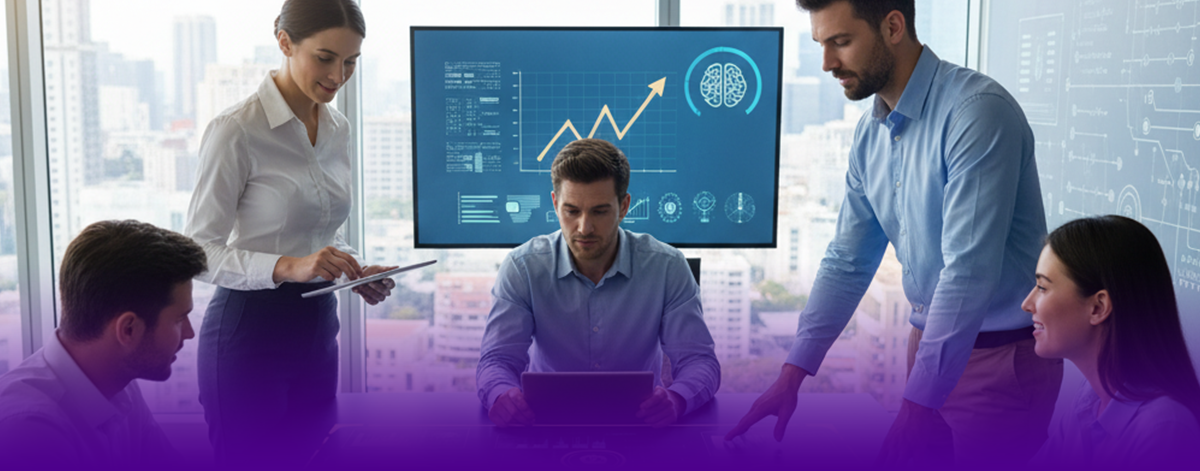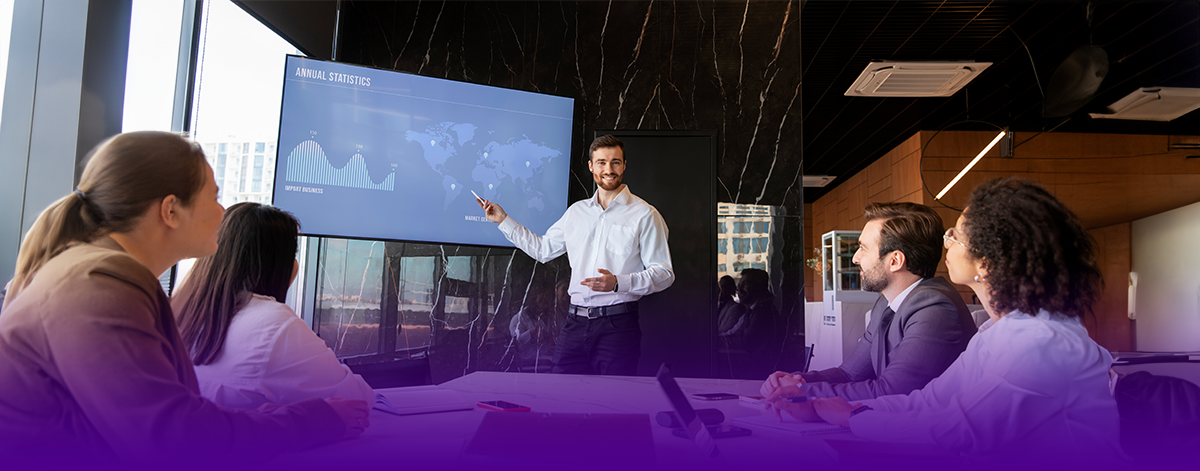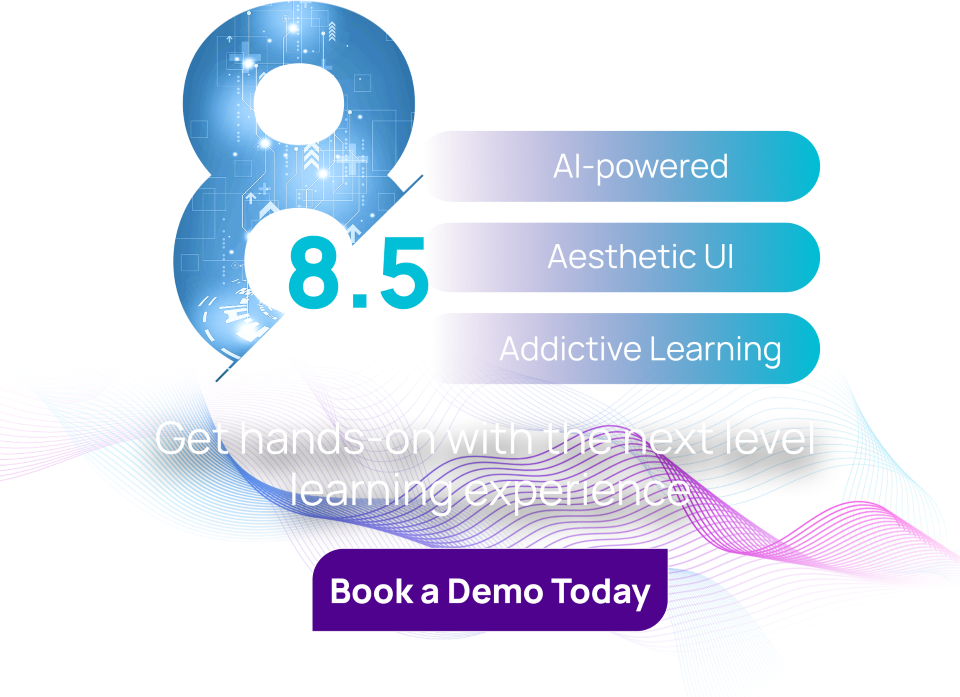
Top Benefits of a Cloud-Based LMS
November 21, 2025
Healthcare LMS: Improving Training in the Medical Field
November 21, 2025Table of contents
Organizations don’t grow; people do. And when employees learn, evolve, and perform better, the business naturally follows suit. That’s why corporate training for employees has become a central pillar for organizations that want to stay ahead in an ever-changing world.
Gone are the days when training meant sitting through long sessions once or twice a year. Today, learning is continuous, digital, and deeply personalized. Employees expect learning experiences that are flexible, engaging, and relevant to their work. And that’s precisely where a modern Learning Management System (LMS) steps in, transforming traditional training into something compelling.
An effective LMS for employees creates an ecosystem of continuous employee development and measurable business impact.
What Corporate Training for Employees Really Means
A corporate training platform for employees is about empowering people to grow professionally and personally. It includes everything from onboarding new hires to upskilling existing teams and nurturing future leaders.
Think of it as giving employees the tools, knowledge, and confidence to perform better and stay motivated. Whether it’s leadership development, sales enablement, compliance, or digital skills, corporate training ensures that everyone moves in sync with organizational goals.
But as teams grow and become more distributed, managing sessions, tracking completion, and maintaining consistency across locations becomes a logistical puzzle. That’s why more companies are turning to workforce training software – a smarter, scalable way to deliver learning at the speed of business.
How LMS Solutions Are Changing Corporate Learning
An LMS for employees brings all learning activities under one digital roof. It helps organizations design, deliver, and measure training efficiently while offering each employee a personalized learning journey.
Let’s look at how a well-designed LMS can turn corporate training for employees into something that works.
- Learning That Fits Every Employee
Every employee learns differently. Some prefer quick videos, others like reading detailed guides, while some learn best by doing. A modern LMS embraces this diversity.
With data- and AI-based recommendations, a modern LMS creates personalized learning paths for every learner, from an entry-level associate brushing up on communication skills to a senior leader sharpening strategy. This personalization keeps learning relevant and helps employees stay curious, motivated, and confident.
2. Building a Culture of Continuous Development
Learning doesn’t stop after onboarding; it’s an ongoing journey. A robust corporate training strategy focuses on continuous employee development, helping teams stay ready for new roles, tools, and challenges.
An LMS makes this seamless. With bite-sized microlearning, interactive content, and mobile access, employees can learn anytime, anywhere: in between meetings, during travel, or even on the shop floor. This accessibility turns learning from an obligation into a daily habit.
3. Clarity Through Tracking and Insights
One of the most significant advantages of using workforce training software is the visibility it provides. With manual programs, it’s often unclear who completed what and whether it made an impact.
An LMS solves this with real-time tracking and analytics. It records participation, scores, time spent, and learning progress. Managers can see who’s excelling, who needs support, and which programs are driving performance, making learning measurable and actionable.
4. Scalable, Cost-Effective, and Efficient
Training thousands of employees manually is time-consuming and expensive. Travel, venues, materials, and the costs add up quickly.
An LMS for employees scales effortlessly. You can onboard hundreds or even thousands of learners across regions at once, without losing consistency. Updates happen instantly, costs drop dramatically, and learners get access to the same high-quality content wherever they are.
5. Making Learning Engaging and Interactive
With interactive learning, people pay attention and remember more. Modern LMS platforms are infused with gamification, storytelling, and real-world scenarios. Employees can earn badges, track progress through leaderboards, and take part in challenges that make learning fun. When training feels like progress, not pressure, engagement naturally soars.
6. Simplifying Compliance Training
Compliance is non-negotiable, especially in industries such as finance, healthcare, and manufacturing. But manually tracking who’s certified or overdue can be a nightmare.
An LMS automates all assignments for mandatory courses, sends reminders, and generates reports. It ensures no one slips through the cracks and your organization always stays compliant and audit-ready.
7. Empowering Global and Hybrid Teams
In today’s world, teams are spread across time zones and work models. Remote work, hybrid setups, and international teams demand a unified approach to learning.
A good LMS for employees bridges this gap. It delivers learning across devices, languages, and regions, ensuring everyone gets a consistent, quality experience. The result? A connected, informed, and empowered global workforce.
Why Corporate Training Is a Strategic Investment
Forward-thinking organizations see corporate training for employees not as a cost but as a long-term investment in growth. When employees feel supported and capable, they bring more creativity, ownership, and performance to their roles.
Here’s what a strong learning culture can unlock:
- Better productivity: Skilled employees work smarter and faster.
- Higher retention: Continuous development keeps people motivated and loyal.
- Greater innovation: Learning encourages experimentation and adaptability.
- Future readiness: Regular upskilling prepares the workforce for what’s next.
Choosing the Right LMS for Employees
Not all LMS platforms are built the same. The right workforce training software should fit your organization’s size, culture, and goals.
Here’s what to look for:
- User-friendly interface: simple to navigate for both learners and admins.
- Integration: works well with your existing HR, CRM, or analytics systems.
- Mobile-first access: enables learning on any device, anytime.
- Analytics: offers detailed reporting on progress and impact.
- Scalability: grows as your organization and training needs expand.
When done right, your LMS becomes more than a training platform; it becomes your partner in employee success.
Making Corporate Training Work for You
Corporate training is no longer a “nice to have” — it’s the foundation of sustainable growth. An LMS for employees brings consistency, engagement, and visibility to your training programs, helping you nurture talent that grows with your business.
A great workforce training software doesn’t just manage learning; it inspires it. It builds a culture where employees are not just trained but transformed.
When organizations invest in their people, the returns go far beyond performance metrics — they build stronger teams, better leaders, and a culture of continuous excellence.
Conclusion: Growing People, Growing Business
At the end of the day, corporate training for employees is about people--helping them grow, adapt, and achieve their very best. A robust LMS for employees brings that vision to life, making learning simple, engaging, and meaningful.
If your goal is to drive real employee development and build a workforce that’s ready for tomorrow, investing in the right LMS is the smartest step you can take today.
We’d love to hear your thoughts! How is your organization using LMS platforms to make corporate training more impactful? Share your experience below.
Other Articles




